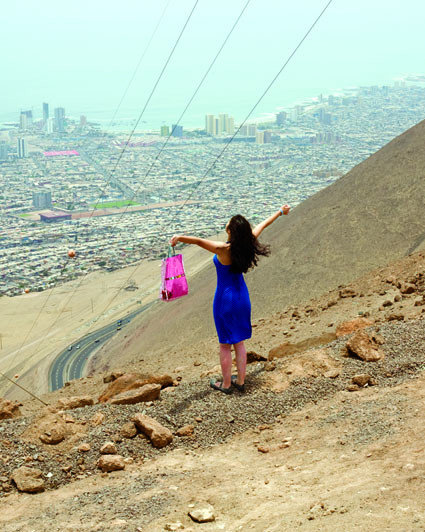12/11/2008
Jordi Colomer
Traversee, Munich
En la pampa. The artist invited a man and a woman that didn't know each other and that were not actors to live certain situations in the Atacama Desert, in the north of Chile. The desert became a vast stage with multiple sets for his photography.

Can we inhabit the desert? Can we inhabit a space with fiction? This is the exercise that I proposed for the project En la pampa. I invited a
man and a woman that didn’t know each other and that were not actors to live certain situations in the Atacama Desert, in the north of Chile.
The desert became a vast stage with multiple sets. Maria and Mateo’s main asset was to succeed in forgetting the camera and to improvise the
dialogues according to the action, for example, to wash a car near an abandoned cemetery. To be completely honest, I have to say that the
main character had once played the role of a tree in a theater show at school. She knew what it was to live in a stage, as a scenographic element
on feet. (Jordi Colomer)
This serie of photographs Pozo Almonte was taken in the Atacama desert, in northern Chile. At the end of the nineteenth century, saltpetre
deposits led to development of the industry; a mass influx of workers formed unique communities and fomented industrial disputes that were
suppressed. The closure of the mines left ghost towns behind, with the exception of Pozo Almonte, which is neighbour to a large, active and
well-kept cemetery.
The systematic framing accentuates the typology but underscores the singularity of each edifice, built as they are of a diverse variety of materials,
some left unadorned, some prettified, carefully fitted out; an architect-less architecture whose realisations are part modernist house, part
family chapel, part beach hut, part cot. Thus, the personal appropriation of formal norms, through these astonishing tombs, reflects the participation
in History of anonymous individuals.
Jordi Colomer born in 1962 in Barcelona is a traveller between the artistic disciplines. Thus he studied art history and architecture and then he
employed the principle of communicating vases between sculpture, architecture, performance, photography and theatre. In 1994-95, he made
an exhaustive study of German cinema between the two World Wars, discovering in Munich Karl Valentin’s work in film, which encouraged the
use of video and left an important mark on his work thereafter. Also this, his newest exhibition, devotes herself to the interdependence between
the disciplines, the tension between reality and fiction. Until January 2009 his project En la Pampa is shown in the Jeu de Paume in Paris to
which also a book has appeared. *
From the project En la Pampa the gallery Traversée shows a videoinstallation, photographs, as well as the photo series Pozo Almonte.
Traversee
Turkenstrasse 11 - Munich



